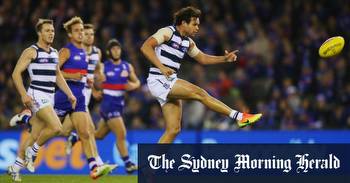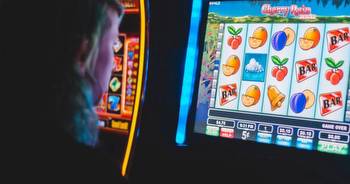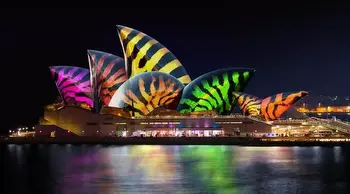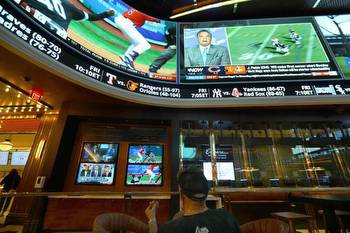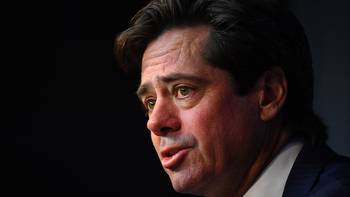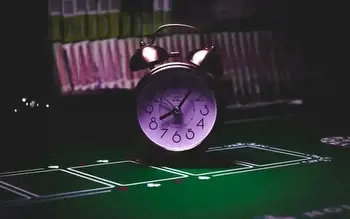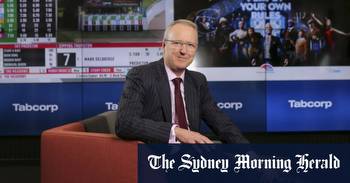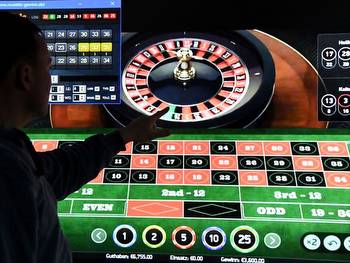Are gambling ads destined to go the way of tobacco ads?
Nationals leader David Littleproud is quick to emphasise he is no wowser when it comes to gambling; he enjoys a punt here and there.
But when he sits down to watch the NRL with his three sons (aged seven, nine and 16), he, like many Australians, is disturbed by the barrage of sports betting advertising blasted into the living room.
“It grates on me as a father,” Littleproud says. “[I’m] with my boys having odds thrown at me on the game that we’re sitting down to watch as a family.”
This week, Littleproud added his name to the ranks of MPs alarmed about the saturation of betting ads during live sports broadcasts and called for a national conversation “about whether or not gambling ads should be on at all” during those events.
By the time the NRL and AFL seasons get underway next year, gambling ads spruiking online betting services will come with a new kicker following the retirement of the current “gamble responsibly” tagline.
Online bookmakers including Sportsbet, bet365 and Ladbrokes will instead be required to include a range of evidence-backed alternatives such as “Chances are you’re about to lose” and “What’s gambling really costing you?” with their ads across TV, radio, print media, websites and apps.
The change, announced by the federal government this week, has fed into a bigger debate about the normalisation of betting within sport and whether this small step heralds a slow tightening of the regulatory noose around the online gambling industry such as occurred with the tobacco industry.
Those hoping so would be dismayed by Prime Minister Anthony Albanese’s response this week when asked about the parallels between the gambling and tobacco industries and if the government had further advertising control measures planned.
“I think they are different problems you are trying to solve. Smoking isn’t good for anybody,” Albanese told Channel 10’s The Project. “There is no problem if people have the occasional punt on the Melbourne Cup or what have you. The problem is a group of people who will become problem gamblers and that can be devastating for them.”
Pressed on whether the new taglines were enough to mitigate the impact of ads bombarding a younger generation of potential gamblers, Albanese said he believed his government had the balance right.
“[We are] not trying to impose a complete nanny-state solution, but trying to warn people that it can be an issue and to give them pause for thought,” he said.
Australia has some of the strictest anti-smoking measures in the world, with total advertising bans on any messaging that seeks to persuade people to buy, smoke or use tobacco. This is complemented by plain packaging laws, banning logos and branding on packets of cigarettes and requiring graphic health warnings.
Online betting companies are already required to comply with some restrictions such as stopping advertising or promotion of odds from five minutes before the scheduled start of play until five minutes after play between 5am and 8.30pm. After 8:30pm, gambling ads can be aired during scheduled and unscheduled breaks, with viewers often barraged with back-to-back ads.
Outside those times, other rules apply, including a ban on representatives of gambling organisations sitting on commentary teams or appearing to broadcast from the venue. No gambling advertising or promotion of odds is allowed during play, but advertising is allowed during breaks.
Harm-minimisation advocates say this has done little to curb the intensity of ads broadcast on free-to-air TV, with research commissioned by the Victorian Responsible Gambling Foundation showing there were an average of 948 gambling ads broadcast daily in the state in 2021.
According to government statistics, Australians have higher gambling losses than any other country on a per capita basis at $1276 a year, while the rate of problem gambling among online gamblers (3.9 per cent) is three times the rate among pokies gamblers (1.4 per cent).
Responsible Wagering Australia, the industry lobby group whose members include bet365, Betfair and Sportsbet, declined to comment.
A group of MPs across federal parliament are unconvinced the current restrictions go far enough. The issue is now a central line of inquiry by the lower house’s standing committee on social policy, which is probing online gambling and its impact on children and problem gamblers.
Submissions to the inquiry close later this month and the committee is expected to begin hearings later this year, with the aim of finalising a report in the first half of 2023.
Committee chair, Labor MP Peta Murphy, notes that it was considered inconceivable to ban cigarette companies from sponsoring sporting codes for a long time, before shifting community attitudes and regulatory crackdowns made pariahs of tobacco companies.
She senses the tide is turning when it comes to the saturation of gambling within sport, whether via advertising or sponsorship.
“Looking at rugby league and AFL, in particular, I think we’re at a point where members of parliament are hearing from their communities enough is enough,” she says.
For his part, Littleproud is not opposed to sponsorship deals between sporting codes or teams and the gambling industry. But he says he is open to backing further controls to protect children from exposure to online betting ads while watching sports.
Queensland Liberal MP Andrew Wallace, a vocal critic of the gambling industry who has pushed for online operators to be banned from accepting credit cards, wants the federal government to clamp down “significantly harder” on live sports betting ads.
“We have indoctrinated in the minds of our young kids that gambling is an essential part of sport and it is not,” Wallace says.
“My view is we should be treating gambling in the same way that we treated cigarette smoking, and that is we identified it as such a significant problem that you just couldn’t advertise on television or any form of media anymore,” he says.
But this regulatory gulf is a long way from being bridged, he says.
“At the moment, the online gambling industry is getting very much a free run from a regulatory perspective.”
Tasmanian independent MP Andrew Wilkie, who has waged a long-running campaign for pokies reform, says it’s conceivable that governments will eventually move towards a total ban on gambling advertising.
“I can see it being banned eventually because there’s just such a public appetite for it. The public hates it,” he says.
“There’s one powerful force against that happening. And that’s not actually the gambling industry. It’s the media because of the revenue from advertising.”
Social Services Minister Amanda Rishworth was coy this week when asked if she wanted to see tougher regulations for the online wagering companies, saying she would work with her state and territory counterparts and the parliamentary inquiry to determine the next steps.
“What I wanted to be done is [for it to be] grounded in good evidence and good research,” she said.
“This area of online wagering has changed very quickly. Australia has one of the highest per capita losses in the OECD, so it’s an area that we can’t not put our attention on.”
Inside Politics newsletter here.














